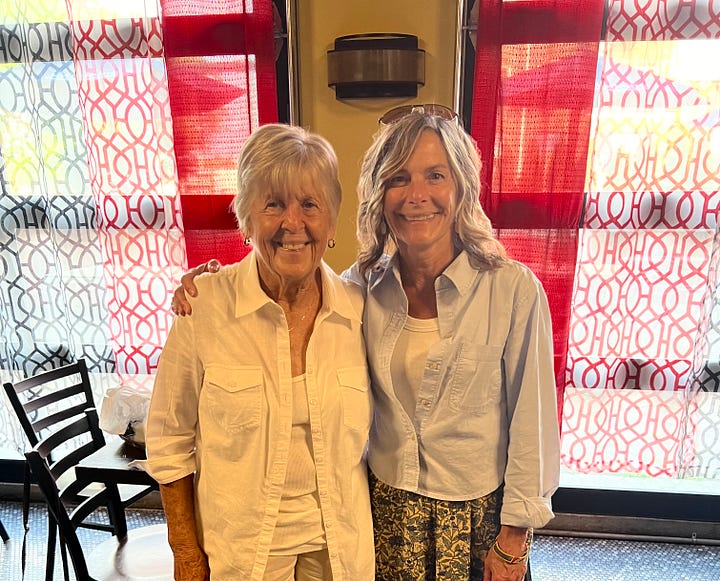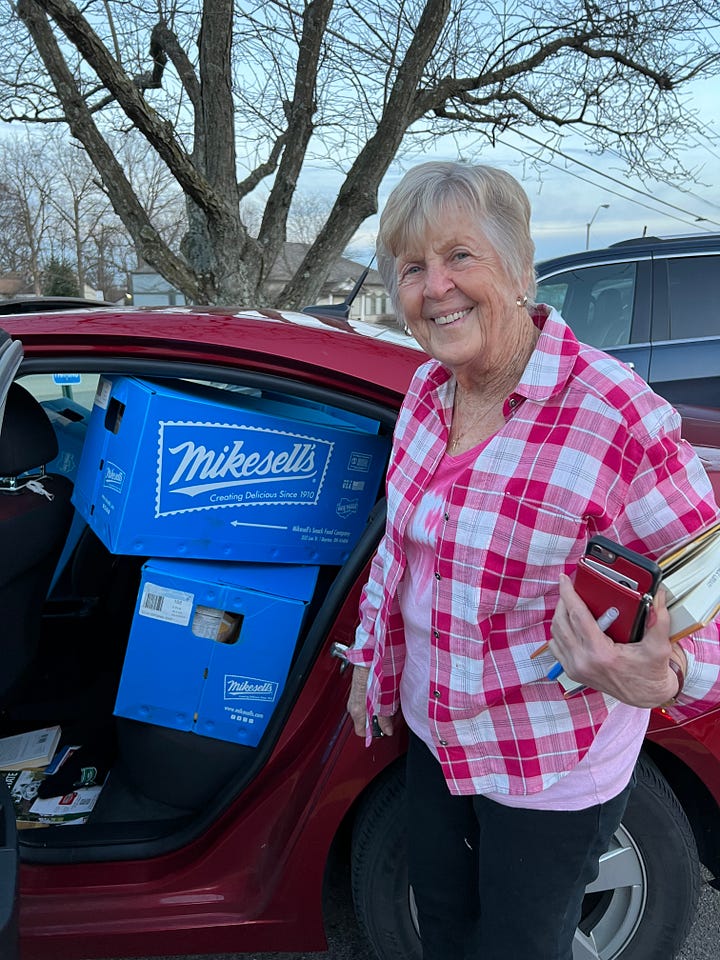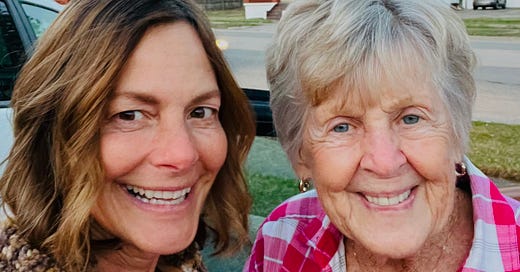A Husband’s Aunt, a Drive-thru Coffee Bar, and NPR
How the three came together to teach me about the world.
When I started dating the man who became my first husband, Devin, I had to quit my job. We worked at the same company. There were unspoken rules to follow despite one’s performance or blessings from above. In a promotion, he became my boss. I preferred a boss of one in personal relationships—me.
Months of interviews with other tech and IT consultancies, cell phone companies, and other avenues left me exhausted. Change came in the form of a coffee cup.
In 1993, Devin and I visited the Pacific Northwest. I fell in love. With a person, a place, a way of being. I didn’t drink coffee but the culture surrounding it, holding warmth in cups or hands, standing against a driving mist off Oregon’s waves, dressing in gortex and ditching the umbrella drew me away from the staid conservatism I experienced as an Ohioan and in my growing adulthood.
In Oregon, small huts (think Polaroid Fotomat) took up space on every corner of Eugene, Portland, and coastal communities. Inside each, they sold coffee to drive-up customers. Coffee was HOT. One of us asked the other, why not open a drive through coffee bar in Cincinnati?
I followed the research, sat in my Jeep Cherokee early mornings for car counts at busy intersections, met with real estate agents and bankers, and decided I had a successful business plan.
For several months, I worked evening shifts at Gratzie Cafe in Kenwood Mall. The owner, Jeff, took me on and said, “If you’re going to do it, do it right.” When customers visited his establishment, he didn’t want them turned off by poorly made coffee drinks crafted at mine. He was referring to making the proper espresso, cappuccino, and latte, educating the public as he had me.
I opened Espress-way in August of 1994, married in September, and closed the business in early 1996 due to a move—to Oregon. During that period, I learned mostly, that I needed NPR, coffee, and Aunt Lynne in my life.
*
I grew up on a steady diet of AM radio stations, including WEOL in Lorain, Ohio, where our family advertised the Januzzi Shoes business. My father carried his beige, crackling transistor radio up and down steps to the basement bathroom for his morning menthol shave, and outside while raking leaves or shoveling show. Everything was known through this funnel of information. Weather, Lorain Catholic basketball games where my older cousins attended and played, football games on Friday nights. Saturday mornings, we attended CCD classes (religion classes for public school Catholic kids). After, my mother dropped us off at Rebman Rec for bowling leagues. We spent hours inside the dusky confines of greasy lanes and smoke-infested carpeting until she returned. The radio was tuned to the famed Paul Harvey and accompanied our drive home with “the rest of the story.”
Throughout high school, any Clevelander worth their ear drums listened to WMMS, Home of the Buzzard. I moved to Akron for college (WZIP), then to Cincinnati. WEBN topped the listening charts. My sister’s friends worked there as deejays. Plus the station was the annual host for the fireworks that exploded over the Ohio River every Labor Day weekend.
NPR? I’d never heard of it.
NPR was about adulting in a world I didn’t know I needed. Several high school classmates had traveled overseas, studied international relations, married a Swedish man, joined the diplomatic corps. Instead, I found the world through through the distinct aromas of a winey Kenyan, a smooth Columbian, a bitter French Roast, and a buttery lick of Somalian coffee. I found salvation in a cup. This virgin coffee drinker consumed it all. Including the news on NPR.
*
In the mid-1990s, after quitting the tech job where my husband worked, I started that drive through the coffee bar. Located in northern Cincinnati close to my home in Loveland, Espress-way was an oasis of coffee, conversation, community. Working solo at the city’s first drive through coffee bar, I opened at 5:30 a.m., closed around 2 p.m. But the environment was missing a key ingredient—Aunt Lynne, (Devin’s aunt).
Lynne spent summer months in Yellowstone, as a charming and boisterous hostess in the lodge. The remaining months when the lodge was closed, she returned to Ohio for work. And I needed help. Living in south Dayton, she drove each weekday morning and arrived at Espress-way for the 7 a.m. shift. By then, the coffee had percolated, the espresso machine warmed up and humming. Its oils coating everything we touched and all that touched us.
One of the first mornings she showed up, Lynne changed over the radio station on the small clock radio to WVXU, the local NPR affiliate. Long a fan of the WYSO in Yellow Springs, Lynne was someone who knew a little more about breaking molds than I did. She turned up the volume and raised the bar on my awareness in the world.
Throughout the course of the morning, Lynne, her steady diet of coffee now fully consumed, greeted customers with a shout with “what’re having?” even if I already knew customers’ orders. Basco founder, Bill Rodhe, swung through, and asked of the news and then, “Lynne, what am I having today?” Suffice to say, I’ve operated in that fashion with Lynne ever since.
NPR was the background musical score to our mornings’ choreography. We danced around each other, pouring “coffees with 2 creamers and 3 sugars,” or “double shot espresso with 2 packets raw sugar” in the 400-square-foot booth to the tune of Morning Edition, All Things Considered, Fresh Air. Ironically, NPR.org launched that same year. But through radio, we shared the news of a labor dispute which cancelled the MLB season. Reviews of the Shawshank Redemption. Who could forget, the OJ Simpson murder trial jury? I remember standing in my home in Loveland with my sister, Laura. We watched the white Bronco chase. And later, heard testimonials for the jury selection. Life changed then. One could feel it, in the same way one does now.
*
Growing up, our family didn’t have robust arguments over worldly events. After being raised by immigrants, a peace had settled over my parents, content to concern themselves with school levies, the price of gas. And shoes. Arguments as kids extended to hair, clothes, and who could borrow that car that night. Other opinions between my parents they kept to themselves. However, my mother complained how we never had grown up talks at the table. There were plenty of opinions, and speaking over one another. But not deep listening.
In my little world of Espress-way, I was truly hearing other sides of the story, which started to inform my own. Items such as ones here in this timeline of news events in 1994, with Andre Agassi near the top. The list reads like a who’s who of those who forget history are condemned…
Racist propaganda, a space probe blows up. Israel, Palestine. Palestine, Israel. We’re living in a similar space now. And of attempts to defund (again) public institutions that reach where private institutions dare not go with their dollars. (Remember Fred Rogers’ 1969 defense of Sesame Street?).
*
Comedien and policital commentator Bill Maher recently railed against NPR funding. “These outlets became popular at a time when Republicans and Democrats didn’t hate each other and weren’t at each other’s throats and didn’t think each other was an existential threat in that world. You can’t have places like this I think anymore; they have to be private.”
Was that so bad? To not hate each other?
NPR and public radio outlets are important because they do still speak to a sane world. Perhaps not the sanitized version children grow up thinking it was. A rational space with rational thinkers. Hosts don’t yell or belittle on that program.
I came up in business at a time when “businesses were streamlining,” Six Habits of Highly Successful People was the bible, JIT manufacturing processes were in place. We spoke in lingo and not to each other. NPR, public radio, gives us that choice and chance to exchange information. When customers pulled up at Espress-way, they got a dose of news too. From us. From radio voices drifting out the window. They got a version they could use in their day. Not to weaponize. To inform.
On a recent trip to and from Detroit, I drove on I-75 across rural landscapes alongside truckers trucking what we buy daily from Amazon. Unable to locate an NPR station for a while, I sang some John Mellencamp into my hand mic. Each time I changed the dial, another Christian radio host railed at me. A sadness came over me for kids stuck tuning in to the grim availability of programming. I have no qualms with Christians. I was raised as one. For people who question what else is out in the world?, they’re told by radio it’s either Jesus or John Mellencamp.
I traveled southward on I-75 toward home. A number of “aviation museums” cropped up at exits along my route. Some might say we should close those too. After writing an op-ed about the defunding of libraries and museum systems, I wondered if those honored aviators learned a little something from libraries and museums—or, like I did, from Aunt Lynne and NPR.
*
Lynne and I remain close. Through our shared losses, especially Devin, we mourn and celebrate the state of the world. I know her burial plans and preferences. Mostly, we talk about insider jokes like “what am I havin’?”, or the time she “jumped two fences, Mommy,” when she babysat Davis. She walks a mile every day. And reminds me how her small but mighty hands not only helped restore the Yellowstone wolves to preserve the ecosystems of the park for all, but rescued a few cartons of Mikesells Potato Chips after the company closed.


If we want to make the US stand tall again, we need NPR, a few cups of coffee to go, and all the Aunt Lynne’s we can get.
April 1 – National Italian American Foundation, Ambassador magazine: NIAF on Location: Cincinnati. Visit: niaf.org for more information.
April 19 – Contemporary Arts Center Creative Writing Project. Runs 8 weeks. FULL.
May 10 – Climate Writing Workshop. My colleague Elaine Olund leads this climate writing workshop as part of Studio Kroner - All Else Pales - 2.
May 13 – Caring for the Caregiver writing experience. Giving Voice Foundation with Pauletta Hansel and Annette Januzzi Wick. In-person. Free. Continues with three other sessions. Sign up here.
May 14 - An Evening of Poetry - All Else Pales 2, Studio Kroner. Poetry readings about the environment Anthology will be available for purchase. Sponsored by Just Earth Cincinnati, a catalyst, empowering residents to make the Cincinnati region a vibrant community in which just, reciprocal and harmonious relationships with the Earth, her people, her creatures, and her ecosystems are cultivated.More information.
August 12 – Caring for the Caregiver writing experience. Giving Voice Foundation with Pauletta Hansel and Annette Januzzi Wick. Virtual. Free. Continues with three other sessions. Sign up here.
November 14 – Caring for the Caregiver writing experience. Giving Voice Foundation with Pauletta Hansel and Annette Januzzi Wick. In-person. Free. Continues with three other sessions. Sign up here.








Beautiful, meaningful story of your life with your Aunt Lynn. And NPR and PBS need our support for sure.